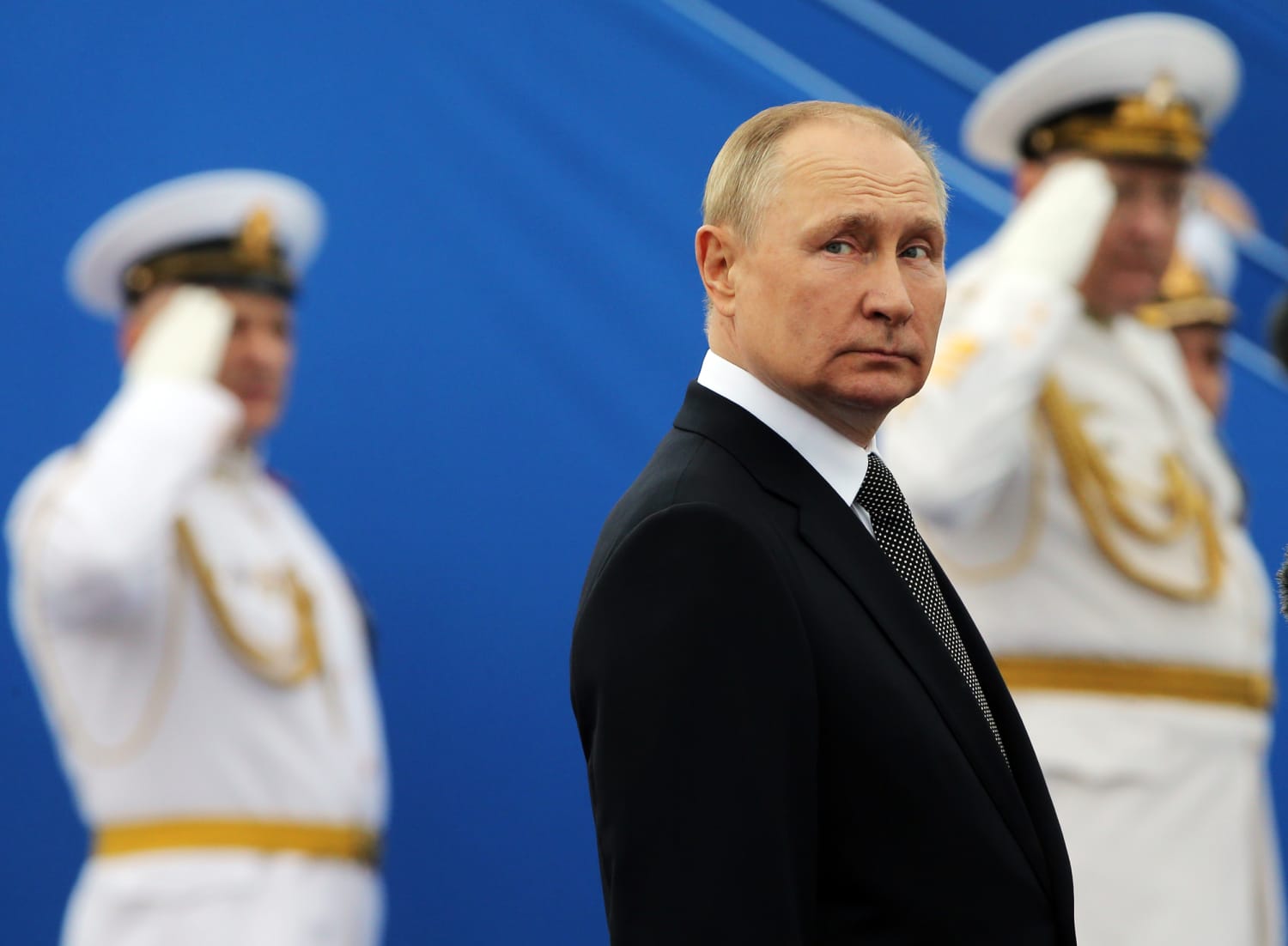With Vladimir Putin determined to win the war he started by invading Ukraine, it is hard to see how the carnage can end while he remains Russia’s president. It is also hard to see what could end his iron, undemocratic rule. However, Vladimir Kara-Murza, a Russian critic of Putin and a journalist frequently published in The Washington Post, suggested a solution to both challenges in remarks he made before the Arizona Legislature in March. Those remarks became the pretext for imprisoning him in Russia because, as Putin must have realized, they were important and compelling.
As a United States judge advocating for the creation of an International Anti-Corruption Court to hold kleptocrats like Putin accountable for their massive corruption, I met Kara-Murza in 2019 at a dinner in London honoring the recipients of an award named for the Russian tax lawyer Sergei Magnitsky. Magnitsky had exposed a $230 million tax fraud by powerful Russians and died in a Russian prison in 2009 after being falsely charged with fraud and tortured.
Because Putin and his closest confidants are far removed from the battlefield, it will be difficult to convict them of war crimes.
Kara-Murza had received a Magnitsky award largely for his leading role in persuading the U.S., the European Union, Canada and Britain to enact laws sanctioning individuals in Russia and elsewhere responsible for violations of human rights. Kara-Murza has been poisoned twice, in 2015 and 2017, most likely by some of the same Russian Federal Security Service agents who seem to have poisoned Putin’s even more prominent, also imprisoned adversary, Alexei Navalny. There is now the real risk that both of them, like Magnitsky, will die in prison.
In Kara-Murza’s address to the Arizona Legislature, he discussed two approaches that might catalyze an end to Putin’s rule and the invasion of Ukraine. The first is the need to get accurate information to the Russian people about the atrocities being committed in their name, something he has been striving to do with some success, even after being jailed upon returning to Russia because he spoke honestly about the war crimes and other offenses the Kremlin is committing in Ukraine. In addition, Kara-Murza condemned the invasion as a “war of aggression that Putin’s regime has unleashed against Ukraine,” noting that “‘war of aggression’ [is] a legal term from the Nuremberg Statute which I am using deliberately.”
Kara-Murza was referring to the 1945 Charter for the International Military Tribunal at Nuremberg, Germany, by which the U.S., Britain, France and the then-Soviet Union created the first international criminal court. That now provides a model for holding Putin and members of his regime accountable. Twenty-two former Nazi leaders were tried for conspiracy, war crimes and crimes against peace — now known as “aggressive war” or “aggression.” The defendants included members of Hitler’s inner circle and accomplices, including private industrialists who aided and abetted the officials’ crimes. All but three of the defendants were convicted. Twelve were sentenced to death. Nuremberg established that conducting a war of aggression is a crime, and put potential perpetrators on notice that they could be punished for it in an international court.
Jailing Kara-Murza is intended to silence him and frighten others who might emulate his brave example. Putin and his confidants evidently know that the threat of prosecution and punishment can influence behavior. If there were the credible threat that Putin and those closest to him would be prosecuted and punished for their crimes concerning Ukraine, their conduct could be altered. It is now urgently important that the international community act on this understanding.
There has been much discussion about prosecuting Putin for war crimes. The attacks on civilians in Ukraine and other atrocities certainly constitute this offense. The International Criminal Court (ICC) has the authority to prosecute Russians for war crimes. However, to convict an individual of committing war crime, it is necessary to prove that he or she personally participated in the criminal conduct or directed or commanded it. Because Putin and his closest confidants are far removed from the battlefield, it will be difficult to convict them of war crimes.
However, invading another country in the absence of an actual or imminent attack that justifies self-defense constitutes the crime of aggression. Launching or conducting a war of aggression is a violation of Article 2(4) of the United Nations Charter. It is also made a crime by statute in many countries. Putin and members of his regime who share official power to plan, initiate or direct the war in Ukraine are guilty of aggression.
But under the statutes creating the ICC and establishing the offenses within its jurisdiction, unless the U.N. Security Council refers the matter to it, the ICC cannot prosecute Russians for the crime of aggression because Russia is not a member of the court. Russia could and certainly would use its veto to block any effort by the Security Council to make such a referral. This does not mean, however, that Putin and his colleagues inevitably have impunity. There are now several serious efforts underway to create a special international court to try Putin and others for the crime of aggression.
One proposal is to have the U.N.establish the court through the General Assembly, which is composed of virtually every country in the world in contrast to the Security Council, which has five permanent members with veto power, including Russia. In March, 141 countries out of the 193 member states in the General Assembly voted for a resolution condemning Russia’s aggression, with only five states — including Russia — voting against it, while 35 countries abstained. A court dedicated to prosecuting Putin and his accomplices for aggression could be established by a treaty between Ukraine, which has a statute criminalizing aggression in its territory, and the U.N. based upon a recommendation of two-thirds of the General Assembly.
Another approach, led by former British Prime Minister Gordon Brown and his colleagues in the United Kingdom, is based on the Nuremberg Tribunal. A group of states that have statutes making aggression an offense that they can prosecute individually wherever the crime is committed would enter into a treaty among themselves, independent of the U.N., establishing a special international court to prosecute on behalf of those states collectively.
One way or another, there is the prospect that there will soon be a court in which Putin and those who share responsibility for the aggressive war being waged in Ukraine could be prosecuted. The crime of aggression is a crime that can be personally committed only by leaders with official power to conduct war. However, any treaty establishing a special international court for Russia’s war of aggression could and should provide authority to prosecute accomplices who do not have the required official power to commit the crime of aggression on their own but have aided and abetted Putin. The authority to prosecute accomplices is provided in the statute establishing the ICC and in treaties creating other international criminal tribunals established by the U.N., such as the International Criminal Tribunal for the former Yugoslavia and the International Criminal Tribunal for Rwanda.
Putin is undoubtedly frustrated, if not furious, that the invasion of Ukraine has been unsuccessful. He may blame some of his colleagues for Russia’s failure and some of them may blame him. There is already speculation that the car bomb that recently killed the daughter of Alexander Dugin, an ardent advocate of the invasion of Ukraine who has been characterized as Putin’s “Rasputin,” was meant for Dugin and placed by the Russian special services or other forces loyal to Putin because of Dugin’s reported criticism of Putin’s leadership during the war. This speculation is unverified and may not be true. However, it has prompted some to question whether the “Kremlin inner circle is turning on Vladimir.”
Perceptions can matter as much as reality, and this attack may instill very real fear among those in Putin’s inner circle who could become victims of his wrath. If they also face the risk of international imprisonment, they may pre-emptively remove Putin from office in an effort to escape formal, and possibly severe informal, punishment themselves. This is a familiar dynamic I have observed as a federal prosecutor and judge in the United States presiding in drug and Mafia cases. Co-conspirators often cooperate against drug kingpins and leaders of other criminal enterprises in an effort to avoid serious punishment.
In his speech in Arizona, Kara-Murza signaled that creating a special international tribunal to try Putin and members of his regime for aggression could contribute greatly to ending the invasion of Ukraine. Kara-Murza undoubtedly knew when he returned to Russia he would be imprisoned and possibly killed. That is a price no one should have to pay for love of country and aspirations for its future. The world owes it to Kara-Murza to make every effort to secure his release, to create a special international tribunal and to ensure that history remembers Kara-Murza as a hero and not as a martyr.
Source: | This article originally belongs to Nbcnews.com











